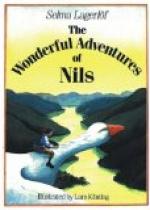Soon he stood on a big square which spread itself in front of the church. It was covered with round stones, and was just as difficult for him to travel over, as it is for big people to walk on a tufted meadow. Those who are accustomed to live in the open—or way out in the country—always feel uneasy when they come into a city, where the houses stand straight and forbidding, and the streets are open, so that everyone can see who goes there. And it happened in the same way with the boy. When he stood on the big Karlskrona square, and looked at the German church, and town hall, and the cathedral from which he had just descended, he couldn’t do anything but wish that he was back on the tower again with the geese.
It was a lucky thing that the square was entirely deserted. There wasn’t a human being about—unless he counted a statue that stood on a high pedestal. The boy gazed long at the statue, which represented a big, brawny man in a three-cornered hat, long waistcoat, knee-breeches and coarse shoes, and wondered what kind of a one he was. He held a long stick in his hand, and he looked as if he would know how to make use of it, too—for he had an awfully severe countenance, with a big, hooked nose and an ugly mouth.
“What is that long-lipped thing doing here?” said the boy at last. He had never felt so small and insignificant as he did that night. He tried to jolly himself up a bit by saying something audacious. Then he thought no more about the statue, but betook himself to a wide street which led down to the sea.
But the boy hadn’t gone far before he heard that someone was following him. Someone was walking behind him, who stamped on the stone pavement with heavy footsteps, and pounded on the ground with a hard stick. It sounded as if the bronze man up in the square had gone out for a promenade.
The boy listened after the steps, while he ran down the street, and he became more and more convinced that it was the bronze man. The ground trembled, and the houses shook. It couldn’t be anyone but he, who walked so heavily, and the boy grew panic-stricken when he thought of what he had just said to him. He did not dare to turn his head to find out if it really was he.
“Perhaps he is only out walking for recreation,” thought the boy. “Surely he can’t be offended with me for the words I spoke. They were not at all badly meant.”
Instead of going straight on, and trying to get down to the dock, the boy turned into a side street which led east. First and foremost, he wanted to get away from the one who tramped after him.
But the next instant he heard that the bronze man had switched off to the same street; and then the boy was so scared that he didn’t know what he would do with himself. And how hard it was to find any hiding places in a city where all the gates were closed! Then he saw on his right an old frame church, which lay a short distance away from the street in the centre of a large grove. Not an instant did he pause to consider, but rushed on toward the church. “If I can only get there, then I’ll surely be shielded from all harm,” thought he.




